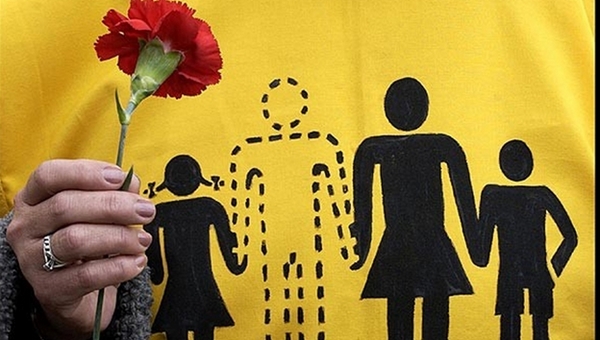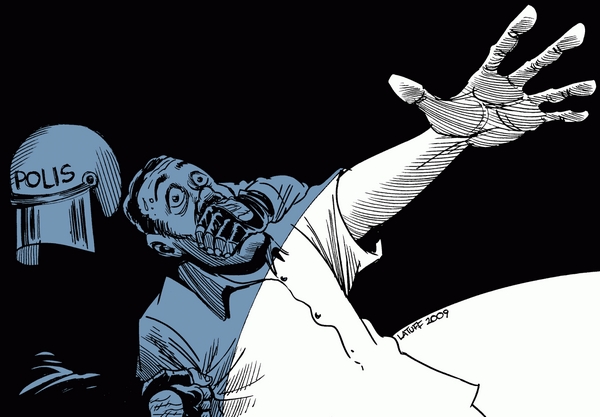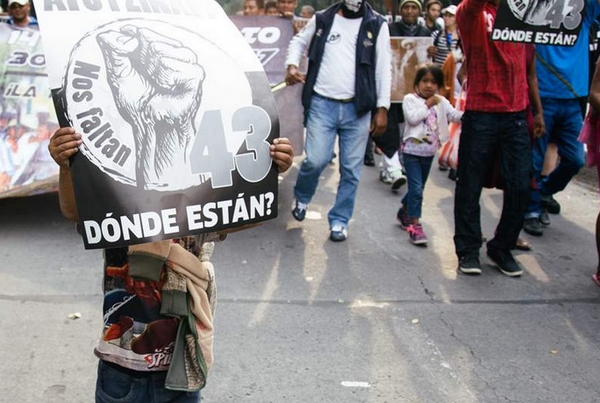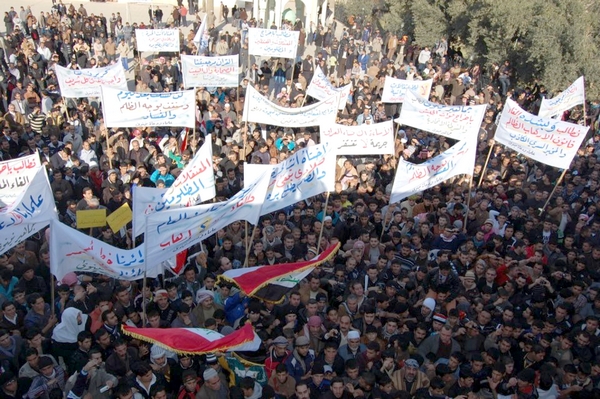30 August 2019
By: Chris Gawronski
 The UN General Assembly, in Resolution 65/209, designated 30 August every year as the International Day of the Victims of Enforced Disappearances. Every year, thousands of people around the world are taken by governments and simply disappear. Enforced disappearance is a tactic used by governments or their proxies to produce insecurity and fear. It occurs when a person is taken, perhaps through arrest or abduction, and held at an unknown location without any acknowledgement by the government. Although targeted against individuals, the practice is used to terrorize and control whole societies.
The UN General Assembly, in Resolution 65/209, designated 30 August every year as the International Day of the Victims of Enforced Disappearances. Every year, thousands of people around the world are taken by governments and simply disappear. Enforced disappearance is a tactic used by governments or their proxies to produce insecurity and fear. It occurs when a person is taken, perhaps through arrest or abduction, and held at an unknown location without any acknowledgement by the government. Although targeted against individuals, the practice is used to terrorize and control whole societies.
In recognition of this global problem and to remember those who have disappeared, the International Day for Victims of Enforced Disappearance is observed each year on 30 August. The day was declared by the UN General Assembly in 2010 in anticipation of the coming into force of the International Convention for the Protection of All Persons from Enforced Disappearance. In its resolution, the General Assembly expressed its concern about the “increase in enforced or involuntary disappearances in various regions of the world,” and stressed “the right of victims to know the truth regarding the circumstances of the enforced disappearance, the progress and results of the investigation and the fate of the disappeared person.”[1]
Background
Enforced disappearance is a global phenomenon. While it has been a well-known tool of military dictatorships, enforced disappearances are also perpetrated in many different situations of internal conflict and power instability, particularly as a means of repressing political opponents. Other frequently targeted people are human rights defenders, the families of those who have already disappeared and the lawyers who help them pursue legal remedies. Today, there is a growing trend of governments using the excuse of fighting terrorism to arbitrarily arrest and detain people who then subsequently disappear.
What is Enforced Disappearance?
The primary international instrument dealing with the issue of enforced disappearance is the International Convention for the Protection of All Persons from Enforced Disappearance (Convention or ICPPED).[2] This complements the International Covenant on Civil and Political Rights, which includes provisions protecting people from arbitrary arrest and detention and guaranteeing equality and recognition before the law.[3]
 |
| Source: Sri Lanka Guardian |
The ICPPED defines enforced disappearance as any “form of deprivation of liberty by agents of the State or by [persons] acting with the authorization, support or acquiescence of the State, followed by a refusal to acknowledge the deprivation of liberty or by concealment of the fate or whereabouts of the disappeared person, which place such a person outside the protection of the law.”[4] The Convention prohibits the use of enforced disappearance and specifically says that “no exceptional circumstances whatsoever” may be used to justify an enforced disappearance.[5] Even when a disappearance is not enforced by the State, the Convention requires State parties to investigate disappearances “committed by persons or groups of persons acting without the authorization, support or acquiescence of the State and to bring those responsible to justice.”[6]
Impacts of Enforced Disappearance
A disappearance, and the lack of information as to the whereabouts or condition of the missing person has a dramatic impact on the victim’s family and community. Most victims of enforced disappearance are men, who are often the sole or primary wage earner for a family. These disappearances can place the affected families in dire economic circumstances, not to mention the emotional and psychological anguish of not knowing if the missing person is still alive or whether their loved one will ever return.
With men being the primary victims, women often become the primary seekers of information and justice for their husbands, sons or brothers. In these situations, the women become vulnerable to abuse and exploitation as they seek information from authorities that may have been responsible for the disappearance. The search for truth can put their lives and their families at risk of suffering the same unknown fate as their loved one. Their difficulties are compounded when they have become the main breadwinner who must provide for themselves and their families while investigating the disappearance of their loved one.
Enforced disappearance leads to violations of various human rights within the affected family. Without sufficient financial support, the rights to an adequate standard of living, health, and education are likely to be violated for the family members.[7] In addition, enforced disappearance directly violates the right of the family unit to protection by the State.[8]
At a larger scale, enforced disappearance is often used to instill anxiety and fear in a community. The chilling effect it has on public activity results in the suppression of various human rights, especially the rights to freedom of expression, belief, association, and peaceful assembly. When enforced disappearance is used against political opponents, it violates the prohibition against discrimination on the basis of political opinion.[9]
Enforced Disappearance in Context: The Case of Iraq
 As has been mentioned, enforced disappearance is a problem worldwide. Countries with more than a thousand cases documented by the UN Working Group on Enforced or Involuntary Disappearances include Algeria, Argentina, El Salvador, Guatemala, Iraq, Peru, and Sri Lanka.[10] Unfortunately, Iraq is a country that has seen particularly heavy, and increasing, use of this tool as a means of silencing political opponents and terrorizing disfavored communities. Although the government insists that this is a problem of the past, both government forces and affiliated militias continue to carry out campaigns of abduction and arbitrary arrest across the country. According to its latest report, the Working Group has 16,420 open cases of enforced disappearance that it has communicated to the Government of Iraq. This is, by far, the largest number of any country, with Sri Lanka being the next largest at 6,030. However, this is only the number of cases reported to the Working Group by individuals and NGOs (including GICJ). The actual number is likely much larger and difficult to know for certain, but groups have estimated the number of forcibly disappeared people in Iraq to be between 250,000 and one million.
As has been mentioned, enforced disappearance is a problem worldwide. Countries with more than a thousand cases documented by the UN Working Group on Enforced or Involuntary Disappearances include Algeria, Argentina, El Salvador, Guatemala, Iraq, Peru, and Sri Lanka.[10] Unfortunately, Iraq is a country that has seen particularly heavy, and increasing, use of this tool as a means of silencing political opponents and terrorizing disfavored communities. Although the government insists that this is a problem of the past, both government forces and affiliated militias continue to carry out campaigns of abduction and arbitrary arrest across the country. According to its latest report, the Working Group has 16,420 open cases of enforced disappearance that it has communicated to the Government of Iraq. This is, by far, the largest number of any country, with Sri Lanka being the next largest at 6,030. However, this is only the number of cases reported to the Working Group by individuals and NGOs (including GICJ). The actual number is likely much larger and difficult to know for certain, but groups have estimated the number of forcibly disappeared people in Iraq to be between 250,000 and one million.
Although enforced disappearances have occurred for many years in Iraq, the country began suffering from a growing phenomenon of unidentified bodies after the US-led invasion in 2003: People would be forcibly disappeared, then their bodies would later be discovered often nearby the site of the arrest or abduction. Increasingly since then, corpses continue to be found dumped in public places after the victims were detained for varying periods of time. A common chain of events leads to the phenomenon of anonymous bodies and mass graves in Iraq: people are taken, then they are tortured, and then they are terminated. Sometimes this happens quickly, but other times it is a long, slow, agonizing experience for the victims and their families.
The problem of enforced disappearances in Iraq has grown dramatically in recent years, and GICJ has reported information regarding thousands of disappeared people to relevant UN human rights mechanisms. This growth is the result of the breakdown of the legal and law enforcement systems in the country coupled with government support of militias. The attempt to incorporate militias into the national armed forces, and the placement of militia leaders in prominent government positions, has resulted in militias becoming a law unto themselves – loyal to no government and able to take whatever actions satisfy their narrow interests. They arrest, detain and execute people according to their own rules or whims. Government support also translates directly into government responsibility for the thousands of enforced disappearances and related crimes of arbitrary detention, torture and extrajudicial killing that have been carried out by the militias and security forces in recent years.
Recent mass burials (in mid-August 2019) have, once again, focused attention on the issue of enforced disappearance in Iraq. GICJ recently received information about the illegal burial of nearly 300 bodies that were transferred by the Babil Governorate to a so-called non-governmental organization for burial. This transfer is a highly irregular procedure that violates Iraqi law and established custom. It is a very serious matter that confirms the improper intentions of the Iraqi authorities by allowing the burial of the bodies without taking the necessary legal steps to identify the victims and return the bodies to the victims’ families. This is also a serious violation of Iraq’s international legal obligations under international human rights law and international humanitarian law.
This information comes from well-informed Iraqi officials and local human rights activists, which confirm that Iraqi authorities have begun to dispose of the bodies of hundreds of victims likely to have been forcibly disappeared for years in secret Iraqi militia detention camps. In fact, the evidence suggests that the bodies are primarily of disappeared people from the Jurf al-Sakhr area south of Baghdad. It came as no surprise, then, when we learned that the group burying the bodies is not simply a non-governmental organization but actually the Iraqi Hezbollah militia – the same group accused of keeping more than 7000 Iraqis in their secret prisons in Jurf al-Sakhr. For this reason, GICJ has called on the UN High Commissioner for Human Rights and the Human Rights Council to support creation of an international committee to fully investigate the situation and determine the whereabouts of the remaining disappeared people.
GICJ Activities and Positions
 |
| Iraqis demanding information about their missing family members |
Geneva International Centre for Justice works closely with NGOs and human rights activists in Iraq, Palestine, and other places gathering evidence on enforced disappearance and reporting the cases to the UN Human Rights Council and other human rights bodies. For example, in 2015, GICJ participated in the 9th session of the UN Committee on Enforced Disappearances, which oversees implementation of the ICPPED. At that session the Committee was reviewing Iraq’s implementation of the Convention, and GICJ submitted reports expressing its serious concern about the systematic practice of arbitrary arrest and abduction by the Iraqi authorities and its affiliated militias, resulting in enforced disappearances.[11]
Additionally, GICJ regularly addresses the UN Human Rights Council with statements describing the latest developments in Iraq and other places. We have written numerous letters to the Working Group on Enforced and Involuntary Disappearances, requesting the Group’s assistance in locating missing persons and encouraging governments to end the abuses perpetrated by security forces and other State actors. Letters about the mass burials in Iraq have been the most recent of our efforts to advocate for an end to enforced disappearance.
GICJ wishes to express its solidarity with the victims of enforced disappearance and their families and communities by condemning this ongoing crime and abuse of power in the hands of arbitrary government officials around the world. We pay tribute to all the victims subject to enforced disappearances and shares condolences with the families who have lost their loved ones and are unaware of their whereabouts.
We urge the international community and all relevant UN bodies to take an active role in pressuring States to cease acts of intimidation or reprisal against those who contribute to the fight against violations to human rights, as well as guaranteeing that any form of interference during investigation procedures is appropriately punished. We stress that all States should ensure the disclosure of the truth regarding what has happened to victims and provide reparation to victims and their families, including restitution, compensation, and rehabilitation.
GICJ Recommendations
Although no form of reparation can fully compensate for the loss of a loved one, GICJ recommends all States do the following to reduce this scourge against the dignity and security of people and their families:
- Become a party to the International Convention for the Protection of All Persons from Enforced Disappearance.
- Take all necessary measures to prevent State actors and their affiliates from perpetrating enforced disappearances.
- Put in place systems to effectively investigate incidents of enforced disappearances and inform the families of the victims.
- Hold all perpetrators to account, including military and political officials who condone or direct others to conduct enforced disappearance.
[1] UN General Assembly, A/RES/65/209 (21 Dec. 2010).
[2] International Convention for the Protection of All Persons from Enforced Disappearance, opened for signature 6 Feb. 2007, 2716 UNTS 3 [hereinafter ICPPED].
[3] International Covenant on Civil and Political Rights, arts. 9, 14, 16, entered into force 23 March 1976, 999 UNTS 171 [hereinafter ICCPR].
[4] ICPPED, supra note 2, art. 2.
[5] Id. art. 1.
[6] Id. art. 3.
[7] International Covenant on Economic Social and Cultural Rights, arts. 11–13, entered into force 3 Jan. 1976, 993 UNTS 3.
[8] ICCPR, supra note 3, art. 23.
[9] Id. arts. 2, 18, 19, 21, 22.
[10] Report of the Working Group on Enforced or Involuntary Disappearances 9–14, UN Doc. No. A/HRC/42/40 (30 July 2019).
[11] Enforced Disappearances in Iraq: A Widespread Challenge, GICJ (14 Sep. 2015), https://www.gicj.org/98-conferences-meetings/committee-on-enforced-disappearances-9th-session/362-press-release-gicj-report-on-enforced-disappearances-in-iraq.
Keywords:
enforced disappearance, victims, ICPPED, international day, Geneva, geneva4justice, GICJ, Geneva International Centre for Justice
Click here to read the previous article on 'International Day of the Victims of Enforced Disappearances'.
Justice, Human rights, Geneva, geneva4justice, GICJ, Geneva International Centre For Justice




